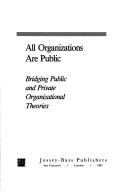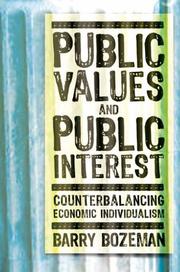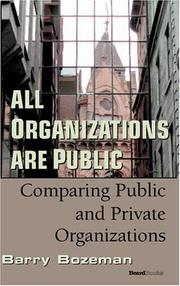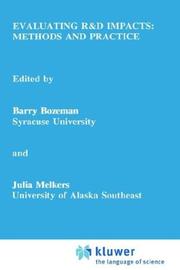| Listing 1 - 10 of 16 | << page >> |
Sort by
|

ISBN: 1555420362 9781555420369 Year: 1987 Publisher: San Francisco, Calif. Jossey-Bass
Abstract | Keywords | Export | Availability | Bookmark
 Loading...
Loading...Choose an application
- Reference Manager
- EndNote
- RefWorks (Direct export to RefWorks)
Organization theory --- Organizational effectiveness --- Organization --- Public administration --- Industrial policy --- Business and politics --- 316.354 --- #SBIB:35H006 --- Organisation Organisatie --- Politique Politiek --- Management public Overheidsmanagement --- Organismes administratifs Overheidsorganisaties --- Action administrative Administratieve actie --- Administration, Public --- Delivery of government services --- Government services, Delivery of --- Public management --- Public sector management --- Political science --- Administrative law --- Decentralization in government --- Local government --- Public officers --- Management --- Organisation --- Business --- Industries --- Industry and state --- Economic policy --- Politics and business --- Politics, Practical --- Political business cycles --- Organisatiesociologie --- Bestuurswetenschappen: theorieën --- Government policy --- Political aspects --- 316.354 Organisatiesociologie

ISBN: 9781589011779 1589011775 1589014014 1435627245 9781435627246 9781589014015 Year: 2007 Publisher: Washington, D.C. : Georgetown University Press,
Abstract | Keywords | Export | Availability | Bookmark
 Loading...
Loading...Choose an application
- Reference Manager
- EndNote
- RefWorks (Direct export to RefWorks)
Economic individualism and market-based values dominate today's policymaking and public management circlesùoften at the expense of the common good. In his new book, Barry Bozeman demonstrates the continuing need for public interest theory in government. Public Values and Public Interest offers a direct theoretical challenge to the utility of economic individualism, the prevailing political theory in the western world. The book's arguments are steeped in a practical and practicable theory that advances public interest as a viable and important measure in any analysis of policy or public adminis
Public debt --- Public interest --- Common good --- Public administration. --- Intérêt public --- Bien commun --- Administration publique (Science) --- Economic aspects --- Aspect économique --- #SBIB:35H52 --- #SBIB:17H20 --- #SBIB:17H3 --- Ethiek van bestuur en beleid --- Sociale wijsbegeerte: algemeen --- Politieke wijsbegeerte --- _0 |a Public interest -- Economic aspects. --- Common good -- Economic aspects. --- Public administration --- Political Science --- Law, Politics & Government --- Political Theory of the State --- Public interest -- Economic aspects. --- Economic aspects. --- Intérêt public --- Aspect économique --- Administration, Public --- Delivery of government services --- Government services, Delivery of --- Public management --- Public sector management --- Good, Common --- Public good --- Political science --- Administrative law --- Decentralization in government --- Local government --- Public officers --- Consensus (Social sciences) --- Justice --- State, The

ISBN: 0136137539 Year: 2000 Publisher: Upper Saddle River, N.J. Prentice Hall
Abstract | Keywords | Export | Availability | Bookmark
 Loading...
Loading...Choose an application
- Reference Manager
- EndNote
- RefWorks (Direct export to RefWorks)
Bureaucracy --- #SBIB:35H006 --- Interorganizational relations --- Political science --- Public administration --- Organizational sociology --- Bestuurswetenschappen: theorieën --- Organization theory

ISBN: 9781587982330 1587982331 Year: 2004 Publisher: Washington : Beard Books,
Abstract | Keywords | Export | Availability | Bookmark
 Loading...
Loading...Choose an application
- Reference Manager
- EndNote
- RefWorks (Direct export to RefWorks)
Organizational sociology --- Public administration --- Administrative agencies --- Industrial management --- Sociologie des organisations --- Administration publique (Science) --- Administration publique --- Gestion d'entreprise --- Management --- Gestion
Book
ISBN: 0312654715 Year: 1979 Publisher: New York (N.Y.): St. Martin's
Abstract | Keywords | Export | Availability | Bookmark
 Loading...
Loading...Choose an application
- Reference Manager
- EndNote
- RefWorks (Direct export to RefWorks)
Policy sciences --- Public administration --- Organization and Administration --- Personnel Management --- Public Policy
Book
ISBN: 3319064681 3319064673 Year: 2014 Publisher: Cham : Springer International Publishing : Imprint: Springer,
Abstract | Keywords | Export | Availability | Bookmark
 Loading...
Loading...Choose an application
- Reference Manager
- EndNote
- RefWorks (Direct export to RefWorks)
Today in most scientific and technical fields more than 90% of research studies and publications are collaborative, often resulting in high-impact research and development of commercial applications, as reflected in patents. Nowadays in many areas of science, collaboration is not a preference but, literally, a work prerequisite. The purpose of this book is to review and critique the burgeoning scholarship on research collaboration. The authors seek to identify gaps in theory and research and identify the ways in which existing research can be used to improve public policy for collaboration and to improve project-level management of collaborations using Scientific and Technical Human Capital (STHC) theory as a framework. Broadly speaking, STHC is the sum of scientific and technical and social knowledge, skills and resources embodied in a particular individual. It is both human capital endowments, such as formal education and training and social relations and network ties that bind scientists and the users of science together. STHC includes the human capital which is the unique set of resources the individual brings to his or her own work and to collaborative efforts. Generally, human capital models have developed separately from social capital models, but in the practice of science and the career growth of scientists, the two are not easily disentangled. Using a multi-factor model, the book explores various factors affecting collaboration outcomes, with particular attention on institutional factors such as industry-university relations and the rise of large-scale university research centers.
Research teams. --- Research groups --- Team research --- Team work in research --- Teamwork in research --- Teams, Research --- Research --- Economic policy. --- Management. --- Entrepreneurship. --- R & D/Technology Policy. --- Innovation/Technology Management. --- Economic Policy. --- Entrepreneur --- Intrapreneur --- Capitalism --- Business incubators --- Administration --- Industrial relations --- Organization --- Economic nationalism --- Economic planning --- National planning --- State planning --- Economics --- Planning --- National security --- Social policy --- Industrial management. --- Business administration --- Business enterprises --- Business management --- Corporate management --- Corporations --- Industrial administration --- Management, Industrial --- Rationalization of industry --- Scientific management --- Management --- Business --- Industrial organization
Book
ISBN: 1400888611 Year: 2017 Publisher: Princeton, NJ : Princeton University Press,
Abstract | Keywords | Export | Availability | Bookmark
 Loading...
Loading...Choose an application
- Reference Manager
- EndNote
- RefWorks (Direct export to RefWorks)
Once upon a time, it was the lone scientist who achieved brilliant breakthroughs. No longer. Today, science is done in teams of as many as hundreds of researchers who may be scattered across continents and represent a range of hierarchies. These collaborations can be powerful, but they demand new ways of thinking about scientific research. When three hundred people make a discovery, who gets credit? How can all collaborators' concerns be adequately addressed? Why do certain STEM collaborations succeed while others fail?Focusing on the nascent science of team science,The Strength in Numbers synthesizes the results of the most far-reaching study to date on collaboration among university scientists to provide answers to such questions. Drawing on a national survey with responses from researchers at more than one hundred universities, anonymous web posts, archival data, and extensive interviews with active scientists and engineers in over a dozen STEM disciplines, Barry Bozeman and Jan Youtie set out a framework to characterize different types of collaboration and their likely outcomes. They also develop a model to define research effectiveness, which assesses factors internal and external to collaborations. They advance what they have found to be the gold standard of science collaborations: consultative collaboration management. This strategy-which codifies methods of consulting all team members on a study's key points and incorporates their preferences and values-empowers managers of STEM collaborations to optimize the likelihood of their effectiveness.The Strength in Numbers is a milestone in the science of team science and an indispensable guide for scientists interested in maximizing collaborative success.
Research teams. --- Group work in research. --- Research --- Group research --- Research groups --- Teamwork in research --- Team research --- Team work in research --- Teams, Research --- Methodology. --- Academic department. --- Academician. --- Adobe. --- Anecdote. --- Assistant professor. --- Associate professor. --- Author. --- Award. --- Career. --- Case study. --- Clinical trial. --- Collaboration. --- Commercialization. --- Communication. --- Competition. --- Competitiveness. --- Consideration. --- Convenience. --- Decision-making. --- Dissemination. --- Distrust. --- Division of labour. --- Doctor of Philosophy. --- Economics. --- Economist. --- Effectiveness. --- Efficacy. --- Engineering. --- Entrepreneurship. --- Finding. --- Funding of science. --- Funding. --- Graduate school. --- Guideline. --- Human Relations (journal). --- Human capital. --- Human resources. --- Human subject research. --- Illustration. --- Institution. --- Intellectual property. --- Interaction. --- Interview. --- Knowledge economy. --- Lead author. --- Level of analysis. --- Literature review. --- Literature. --- Matthew effect. --- Measurement. --- Medical research. --- Mentorship. --- Motivation. --- National Science Foundation. --- Organizational culture. --- Percentage. --- Personality clash. --- Pharmaceutical drug. --- Postdoctoral researcher. --- Principal investigator. --- Profession. --- Project team. --- Project. --- Public policy. --- Public value. --- Publication. --- Qualitative research. --- Questionnaire. --- Reputation. --- Requirement. --- Research and development. --- Research center. --- Research ethics. --- Respondent. --- Response rate (survey). --- Result. --- Science of team science. --- Science policy. --- Science studies. --- Scientist. --- Scientometrics. --- Sexual harassment. --- Sharing. --- Skill. --- Social capital. --- Social dynamics. --- Social exchange theory. --- Social science. --- Suggestion. --- Supervisor. --- Team leader. --- Team management. --- Technology transfer. --- Technology. --- Theory. --- Thesis. --- Thought. --- Transaction cost. --- Virtual collaboration. --- Writing.
Digital
ISBN: 9783319064680 Year: 2014 Publisher: Cham Springer International Publishing
Abstract | Keywords | Export | Availability | Bookmark
 Loading...
Loading...Choose an application
- Reference Manager
- EndNote
- RefWorks (Direct export to RefWorks)
Today in most scientific and technical fields more than 90% of research studies and publications are collaborative, often resulting in high-impact research and development of commercial applications, as reflected in patents. Nowadays in many areas of science, collaboration is not a preference but, literally, a work prerequisite. The purpose of this book is to review and critique the burgeoning scholarship on research collaboration. The authors seek to identify gaps in theory and research and identify the ways in which existing research can be used to improve public policy for collaboration and to improve project-level management of collaborations using Scientific and Technical Human Capital (STHC) theory as a framework. Broadly speaking, STHC is the sum of scientific and technical and social knowledge, skills and resources embodied in a particular individual. It is both human capital endowments, such as formal education and training and social relations and network ties that bind scientists and the users of science together. STHC includes the human capital which is the unique set of resources the individual brings to his or her own work and to collaborative efforts. Generally, human capital models have developed separately from social capital models, but in the practice of science and the career growth of scientists, the two are not easily disentangled. Using a multi-factor model, the book explores various factors affecting collaboration outcomes, with particular attention on institutional factors such as industry-university relations and the rise of large-scale university research centers.
Methodology of economics --- Economic policy and planning (general) --- Economics --- Business management --- Business economics --- technologiebeleid --- financieel management --- bedrijfseconomie --- ondernemingsstrategieën --- economie --- economische politiek --- ondernemen

Abstract | Keywords | Export | Availability | Bookmark
 Loading...
Loading...Choose an application
- Reference Manager
- EndNote
- RefWorks (Direct export to RefWorks)
Policy sciences --- Research --- -Research --- -System analysis --- Evaluation --- Management
Book
Abstract | Keywords | Export | Availability | Bookmark
 Loading...
Loading...Choose an application
- Reference Manager
- EndNote
- RefWorks (Direct export to RefWorks)
| Listing 1 - 10 of 16 | << page >> |
Sort by
|

 Search
Search Feedback
Feedback About
About Help
Help News
News